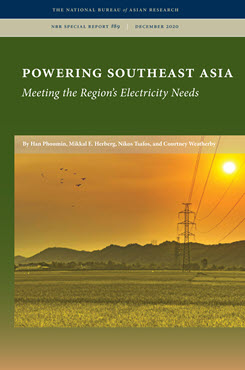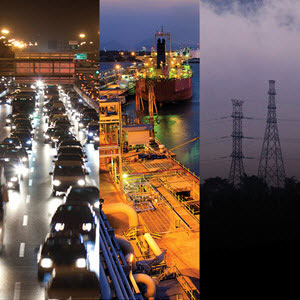NBR Special Report no. 89
High-Quality Infrastructure and the Free and Open Indo-Pacific Vision
This essay examines the energy initiatives rolled out by Japan and the U.S. as part of their “free and open Indo-Pacific” visions to compete with China’s energy financing and investment in Southeast Asia as regional governments decide how to best meet rising electricity demand.
EXECUTIVE SUMMARY
MAIN ARGUMENT
With Southeast Asia expected to see continued rapid economic and energy demand growth over the next two decades, policymakers are faced with the dual challenge of attracting the huge investments required to meet rising power demand while also transitioning toward a cleaner power mix. At the same time, the U.S. and Japan have begun initiatives to promote high-quality infrastructure (HQI) that can potentially help policymakers across the region achieve these goals. With an emphasis on transparency, these projects seek to mobilize private capital, in contrast to China’s state-funded Belt and Road Initiative (BRI). However, to unlock the full potential of funding for HQI, policymakers must first understand and identify needed policy and market reforms.
POLICY IMPLICATIONS
- In order for HQI initiatives to succeed, there must be major energy policy reforms to attract the huge amount of investment and financing for power generation. Most importantly, reforming natural gas markets and pricing and opening up to private investment are required to take advantage of a surge in available, competitively priced liquefied natural gas (LNG) in Asia.
- To be successful, proponents of HQI need to finance, support, and accelerate the energy policymaking capacities, training, and skills required to evaluate new projects and investments in natural gas and renewable energy infrastructure. Environmental, transparency, procurement, and other reforms will lengthen and complicate the evaluation and decision-making process, resulting in the possible continuation of the policymaking default to simpler, more standard coal-fired power capacity, often from BRI sources.
- The U.S. and Japan, along with other partners, must prioritize mobilizing international private capital from investment funds, infrastructure funds, pension funds, sovereign wealth funds, and U.S. and Japanese companies to provide the investments and financing needed to make HQI initiatives successful. To effectively leverage the most private capital possible, they must carefully target their public share of funding.
Mikkal E. Herberg is Senior Advisor to the National Bureau of Asian Research(NBR) and Research Director of NBR’s Energy Security Program. He is also a Senior Lecturer in the Graduate School of International Relations and Pacific Studies at the University of California, San Diego.



